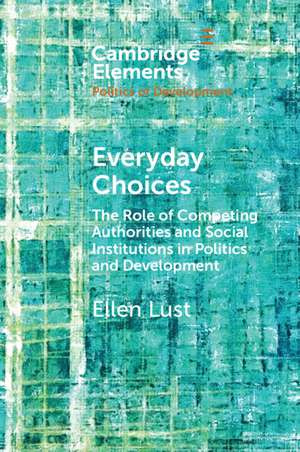Everyday Choices: The Role of Competing Authorities and Social Institutions in Politics and Development: Elements in the Politics of Development
Autor Ellen M. Lusten Limba Engleză Paperback – 7 dec 2022
Preț: 143.76 lei
Nou
Puncte Express: 216
Preț estimativ în valută:
27.51€ • 28.62$ • 22.71£
27.51€ • 28.62$ • 22.71£
Carte tipărită la comandă
Livrare economică 12-26 aprilie
Preluare comenzi: 021 569.72.76
Specificații
ISBN-13: 9781009306126
ISBN-10: 100930612X
Pagini: 75
Dimensiuni: 152 x 228 x 6 mm
Greutate: 0.14 kg
Editura: Cambridge University Press
Colecția Cambridge University Press
Seria Elements in the Politics of Development
Locul publicării:New York, United States
ISBN-10: 100930612X
Pagini: 75
Dimensiuni: 152 x 228 x 6 mm
Greutate: 0.14 kg
Editura: Cambridge University Press
Colecția Cambridge University Press
Seria Elements in the Politics of Development
Locul publicării:New York, United States
Cuprins
1. Introduction; 2. State centrality in politics and development; 3. Conceptualizing arenas of authority and social institutions; 4. Which arenas matter, when and why; 5. Social institutions, politics and development outcomes; 6. Reconsidering 'state' institutions; Conclusion; References.
Descriere
Setting the state and non-state authorities on equal footing fosters knowledge accumulation and more effective development programming.













